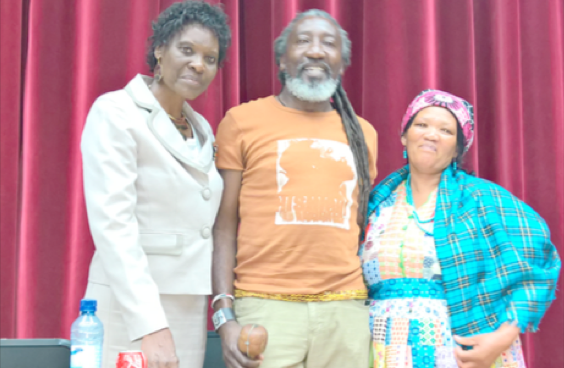A SPIRITUALIST has defended the use of traditional healers in Namibia saying it is how people have all along been curing themselves of illnesses before the advent of modern day medicine.
Ndasuunye Shikongeni, popularly known as “Papa”, is an internationally and nationally recognised artist, as well as a storyteller, spiritualist and leader in Namibia’s post-independence arts education and culture.
Shikongeni was speaking during a panel discussion last Wednesday held at the Unam School of Medicine which discussed whether traditional herbalists still have a role to play in the health sector.
The Museums Association of Namibia also held a mobile exhibition which focused on the medicinal use of plants by traditional healers in Namibia and sought to encourage discussion on the role of traditional healers.
Shikongeni stressed that no one tells the truth about who they (traditional healers) really are.
“Spirituality is a calling through dreams. Our origins are ignored in the city. When the missionaries came they took away the power of the healing society. They called our fathers eendudu, healers and they labelled it satanism. That is why young people today do not believe in it because of the connotation attached to it,” he said.
Shikongeni also criticised the bogus traditional healers saying genuine healers do not charge a lot of money for their services.
He gave examples of some of the indigenous plants they use for healing pointing out that they use devil’s claw for cleaning, as an antibiotic, or when a patient has high blood pressure.
“Most of the time, we do not use the medicine when you are sick. We use the medication to prevent illness. Today’s generation waits for the sickness and then try and heal themselves,” he said.
Shikongeni said the aloe is used to clean one’s blood or when a woman gives birth.
“The roots are taken, boiled and given to her to drink. It is also used when twins are born. The mother and father as well as the children will be washed in that because those are ‘aakwanilwa’,” he said.
Veteran Namibian medical doctor specialising in maternal and child health, Dr Theopolina Tueumuna, said other health professions are regulated by the councils and there is therefore a need to regulate the traditional healers as well.
Tueumuna said when traditional medication is administered to a sick person, there is always a possibility of making the situation worse because while the medicine might be good for healing, there is no standard measure for dosages that are given.
“What dosage will kill both the illness and the patient? That is one of the big problems.
“Most of the people who receive prolonged treatment from traditional healers later die from liver or heart failure because those are the organs that generally clean the system of excess medication that we take in,” she said. Dr Tueumuna said Kavango, Omusati, Ohangwena, Oshikoto and Oshana regions each has one traditional healer per 500 people.
Zambezi has one traditional healer for every 300 people and Katutura in Windhoek has one for 1 000 people.
“Therefore to have traditional healers practising without any regulation is obviously not safe.
You need a certain amount of time to be competent for anything, particularly when you are dealing with people’s lives,” she said.
The Traditional Health Practitioners Bill which is intended to regulate the work of traditional healers is currently being considered.
Stay informed with The Namibian – your source for credible journalism. Get in-depth reporting and opinions for
only N$85 a month. Invest in journalism, invest in democracy –
Subscribe Now!






